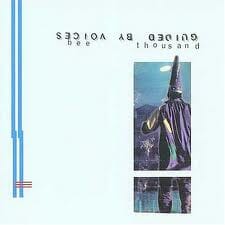The 20 Best Songs on Guided By Voices’ Bee Thousand

Bee Thousand turns 30 today. Guided By Voices’ breakout record became an instant classic the day it came out, almost immediately lifting the band from obscurity to the upper echelons of mid-’90s indie rock success, an entirely different plane of obscurity that meant they were still less famous than one-time hitmakers Dishwalla or Primitive Radio Gods or that band who sang about the banditos. Bee Thousand introduced Robert Pollard and his prodigious songwriting acumen to a wider audience, cramming almost two dozen songs into just under 37 minutes, almost every one sounding like a possible radio smash from a world where recording technology never progressed past the four-track. Most importantly, it led countless young men into a lifelong love affair with rock music and alcoholism, forever equating the two and uniting them into sweaty, chant-filled biathlons of male bonding and hearing loss at mid-sized indie rock clubs the world over. In honor of Bee Thousand’s 30th anniversary, and in no particular order, here are the 20 best songs* from Guided By Voices’ most iconic record.
1. “Hardcore UFO’s”
It doesn’t matter what a “hardcore UFO” is. What matters is the majestic but rundown intro, the anticipation that something pivotal is about to happen, the ingrained nostalgia of “playing solos” and getting “amplified to rock.” If this was the first you’d heard of GBV, you already knew the score: timeless rock songs that are impeccably written but tossed-off in a non-studio by hobbyists.
2. “Buzzards and Dreadful Crows”
This song is built around Pollard’s vocals, particularly in the chorus. It begins with that faux-tuff blues strut that stumbles through some of GBV’s worst songs, like your dad doing a Mick Jagger impersonation, but it’s almost immediately rescued by Pollard’s inflection on the second line. The bridge slides it into the lead even before it hits the chorus, where the melody and lyrics effortlessly combine into one of those timeless bits of songwriting where every syllable and note seem perfectly matched.
3. “Tractor Rape Chain”
Hey, that last sentence you just read, at the very end of the entry above? About the words and notes meshing perfectly? Goes double for “Tractor Rape Chain.” Despite the questionable name, this remains one of Pollard’s 10 or so best songs. His lyrics remain surreal, especially during the chorus, but there’s an emotional weight to the verses and the main guitar hook.
4. “The Goldheart Mountaintop Queen Directory”
The somber, low-key “Queen Directory” turns from eerie to anthemic after a trip through “the hallway of shatterproof glass.” That tonal shift is echoed by some of Pollard’s most portentous and dread-filled imagery, turning a scene of terror and reckless abandon into a cry for freedom. Is this the first appearance of the manic pixie dream girl in an indie rock song?
5. “Hot Freaks”
Probably the worst song ever made by man. It’ll wind up in Cialis ads in 10 years—if a middle-aged penis could play rock music, it would sound like this.
6. “Smothered in Hugs”
Let’s not shortchange the music to “Hugs”—it’s a powerful exercise in repetition, with the band chugging through a single riff (with slight variations) for three minutes. Again, though, it’s mostly Pollard’s words and melody that make this one of the band’s most beloved songs. As he solemnly intones over the drone about judges, saints and textbook committees, “Hugs” almost sounds like a working-class riff on “Tomorrow Never Knows.”
7. “Yours to Keep”
A haunting trifle, this acoustic snippet is essentially an intro for “Echos Myron.” It proves that even their shortest and most unguarded moments can result in indelible memories.
8. “Echos Myron”
Pollard sings “most of us are quite pleased with the same old song” on the most conventionally accessible thing on the album, but that doesn’t mean “Echos Myron” is more of the same. It’s an exceptionally crafted pop song, with Beatles-esque hooks and harmonies, and some of Pollard’s most cohesive and dramatic lyrics. It’s a perfect distillation of the promise of pop.
9. “Gold Star for Robot Boy”
“Gold Star” is no less catchy than the pristine lo-fi pop of “Echos Myron,” but it’s a good bit noisier, with a fuzz-drenched guitar basically playing a single clamorous note the entire way through. It reasserts the band’s rougher edges (which might sound ridiculous to somebody hearing the plenty rough Bee Thousand for the first time, but rest assured this album as a whole is cleaner and more accessible than the handful that preceded it) without sacrificing Pollard’s ability to write unforgettable should-be hits.
10. “Awful Bliss”
Tobin Sprout’s first song on Bee Thousand is another acoustic respite, and a characteristically sweet but melancholy slice of earnest pop balladry.